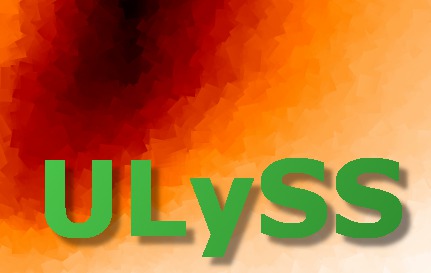function derive_3d, TMPARR=tmparr, GRID=grid
compile_opt idl2, hidden
s = size(tmparr)
if (s[0] ne 3) then return, -1
if (n_elements(grid) ne s[2]) then return,-1
d2 = tmparr*0.0
for j=0,s[3]-1 do begin
d2[*,*,j] = uly_2deriv(grid,tmparr[*,*,j])
endfor
return, d2
end
function uly_ssp_read, model_file,$
TEMPLATE_GRID=template_grid, $
WAVERANGE=waverange, VELSCALE=velscale, $
AGERANGE=agerange, METALRANGE=metalrange, $
LSF=lsf_file, $
SIGMA=sigma, QUIET=quiet
compile_opt idl2
on_error, 0
if uly_ssp_chck(template_grid, $
WAVERANGE=waverange, VELSCALE=velscale, $
AGERANGE=agerange, $
METALRANGE=metalrange, $
MODEL_FILE=model_file, QUIET=quiet $
) eq 1 then return, template_grid
bad = 0
if n_elements(model_file) eq 0 then begin
str = 'MODEL_FILE, must be defined'
bad = 1
endif
if n_elements(model_file) ne 1 then begin
str = 'MODEL_FILE, must be a scalar or 1 element array'
bad = 1
endif
if bad ne 1 then begin
if file_test(model_file, /READ) ne 1 then begin
str='MODEL_FILE, must be a file '
if size(model_file, /TYPE) eq 7 then str += '('+ model_file+') '
bad = 1
endif
endif
if bad eq 1 then begin
print, 'ULY_SSP_READ: Usage:'
print, ' grid = uly_ssp_read(model_file, $'
print, ' TEMPLATE_GRID=template_grid, $'
print, ' WAVERANGE=waverange, VELSCALE=velscale, $'
print, ' AGERANGE=agerange, METALRANGE=metalrange, $'
print, ' LSF=lsf_file, $'
print, ' SIGMA=sigma, QUIET=quiet)'
if n_elements(str) gt 0 then message, /INFO, str
return, -1
endif
if not keyword_set(quiet) then print, 'Read the model ', model_file
time0 = systime(1)
if not keyword_set(quiet) then print, 'read the file ', model_file
fits_open, model_file, fcb, /NO_ABORT, MESSAGE=messg
if messg ne '' then begin
message, messg, /INFO
return, -1
endif
if uly_ssp_chck(template_grid) eq 1 then grid = template_grid $
else grid = uly_ssp_alloc()
fits_read, fcb, *grid.data, *grid.hdr, MESSAGE=messg
if messg ne '' then begin
message, messg, /INFO
return, -1
endif
grid.start = double(string(sxpar(*grid.hdr, "CRVAL1")))
grid.step = double(string(sxpar(*grid.hdr, "CD1_1")))
if strtrim(sxpar(*grid.hdr, "CTYPE1")) eq 'AWAV' then grid.sampling = 0 $
else grid.sampling = 1
if n_elements(waverange) eq 2 then begin
wr = uly_spect_get(grid, /WAVERANGE)
if wr[0] gt waverange[1] or wr[1] lt waverange[0] then begin
message, 'Invalid WAVERANGE: '+strjoin(strtrim(waverange,2),','), /INFO
return, -1
endif
endif
if size(*grid.data, /N_DIM) eq 4 then begin
*grid.o_mgfe = sxpar(*grid.hdr, "MGFE*")
endif
fits_read, fcb, *grid.o_age, EXTNAME='AGE', MESSAGE=messg, /NO_ABORT
if messg ne '' then begin
message, messg+'(AGE hdu)' , /INFO
return, -1
endif
fits_read, fcb, *grid.o_metal, EXTNAME='METAL', MESSAGE=messg, /NO_ABORT
if messg ne '' then begin
message, messg+'(METAL hdu)', /INFO
return, -1
endif
fits_read, fcb, mask, EXTNAME='MASK', MESSAGE=messg, /NO_ABORT
if messg ne '' then begin
npix = (size(*grid.data, /DIM))[0]
mask = bytarr(npix) + 1B
endif
fits_close, fcb
masked = where(mask gt 0, cnt)
if cnt gt 0 then *grid.goodpix = masked $
else if not keyword_set(quiet) then $
print, 'Ignore the MASK ... there is no valid data'
if n_elements(agerange) gt 0 then begin
nage = where(*grid.o_age ge agerange[0] and *grid.o_age le agerange[1],cnt)
if cnt gt 0 then begin
*grid.data = (*grid.data)[*,nage,*]
*grid.o_age = (*grid.o_age)[nage]
endif else if not keyword_set(quiet) then $
print, 'The demanded range:', strtrim(agerange,2), $
'contain 0 elements of the grid range:',*grid.o_age, $
'...read all the grid'
endif
if n_elements(metalrange) gt 0 then begin
nmet = where(*grid.o_metal ge metalrange[0] and *grid.o_metal le metalrange[1], cnt)
if cnt gt 0 then begin
*grid.data = (*grid.data)[*,*,nmet]
*grid.o_metal = (*grid.o_metal)[nmet]
endif else if not keyword_set(quiet) then $
print, 'The demanded range:', strtrim(metalrange,2), $
'contain 0 elements of the grid range:',*grid.o_metal, $
'...read all the grid'
endif
grid.title = model_file
if n_elements(waverange) ne 0 then *grid.waverange = waverange
log_rebin = 0
if n_elements(velscale) eq 1 or n_elements(lsf_file) eq 1 or $
n_elements(sigma) eq 1 then log_rebin = 1
if log_rebin then begin
grid = uly_spect_logrebin(grid, velscale, WAVERANGE=waverange, /EXACT, /OVERWRITE)
if not uly_spect_get(grid, /VALID) then begin
message, 'Could not log-sample the grid', /INFO
return, -1
endif
endif
if not keyword_set(quiet) then print, 'model reading time=', systime(1)-time0
if n_elements(sigma) gt 0 then begin
if grid.sampling ne 1 then message, $
'ULY_SSP_READ: cannot convolve because the grid is not log-sampled'
if not keyword_set(quiet) then begin
print,'Convolve the model with Gaussian, sigma=', sigma, ' km/s'
endif
uly_slit, 0d, sigma, 0d, 0d, velscale, lsf
*grid.data = convol((*grid.data), lsf, /EDGE_TRUNCATE)
endif
if n_elements(lsf_file) ne 0 then begin
uly_spect_lsfconvol, lsf_file, grid
endif
timed0 = systime(1)
if size(*grid.data, /N_DIM) le 3 then begin
*grid.d2t = derive_3d(TMPARR=*grid.data, GRID=*grid.o_age)
endif else begin
form = size(*grid.data,/DIM)
tot = n_elements((*grid.data)[*,*,*,0])
*grid.d2t = [reform(derive_3d(TMPARR=(*grid.data)[*,*,*,0], GRID=*grid.o_age), tot),$
reform(derive_3d(TMPARR=(*grid.data)[*,*,*,1], GRID=*grid.o_age),tot)]
*grid.d2t = reform(*grid.d2t, form)
endelse
if not keyword_set(quiet) then print, 'model deriving time=', systime(1)-timed0
return, grid
end

